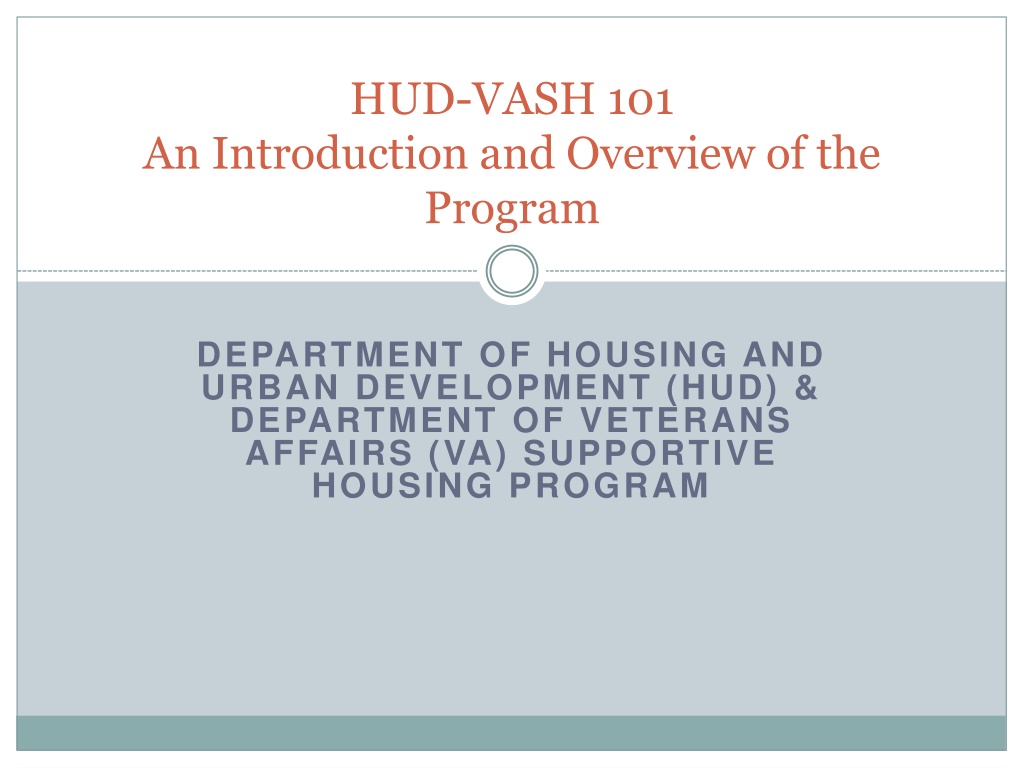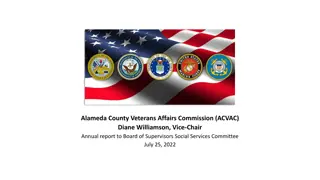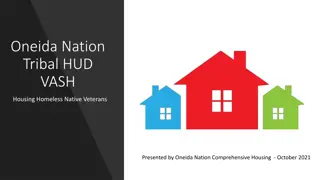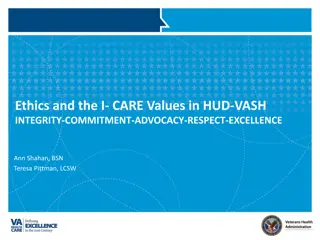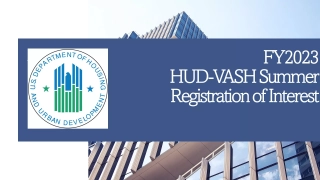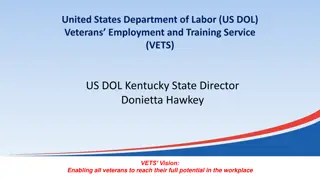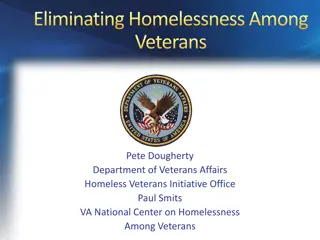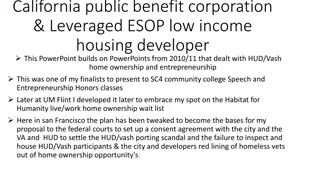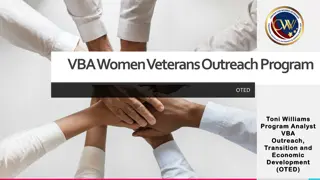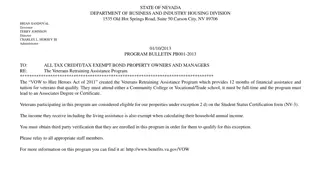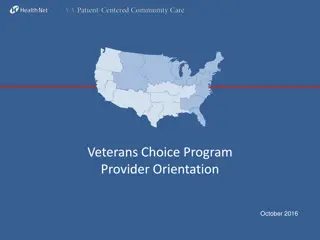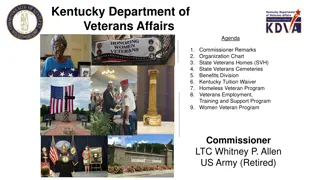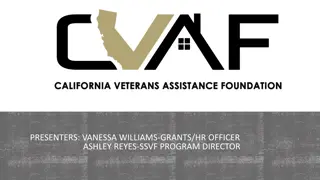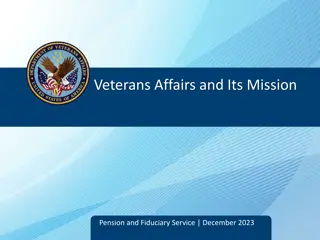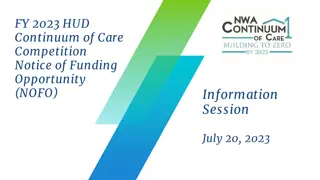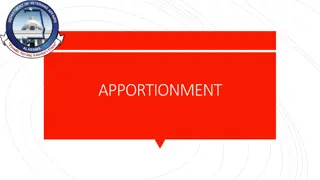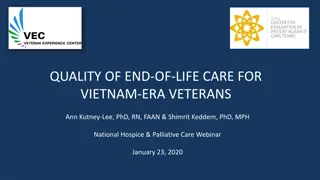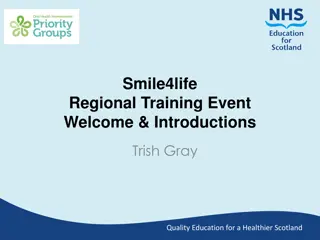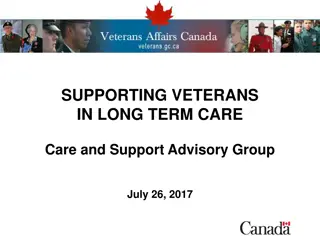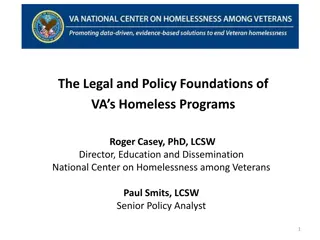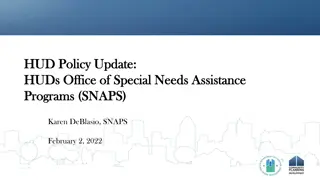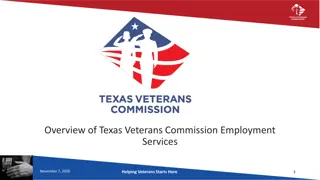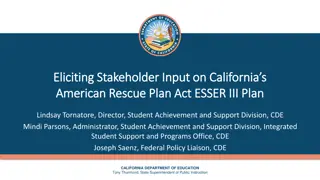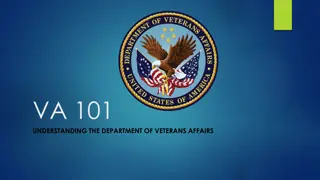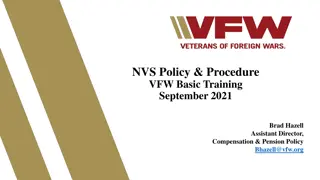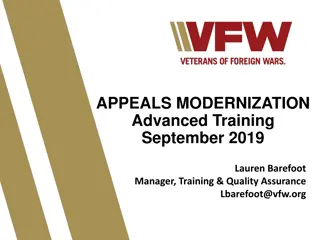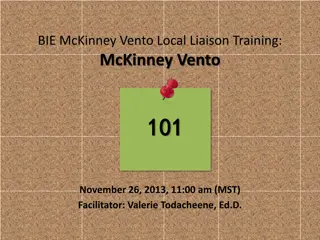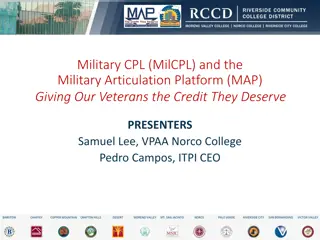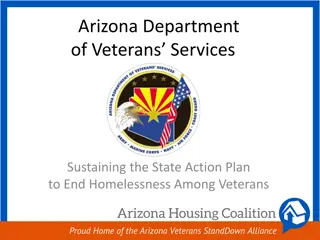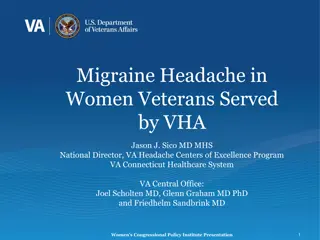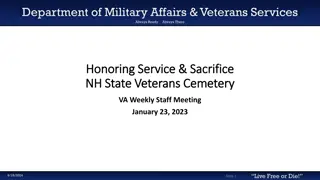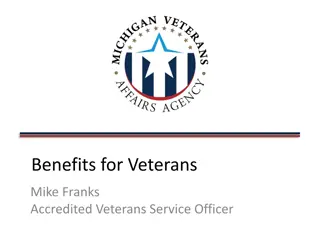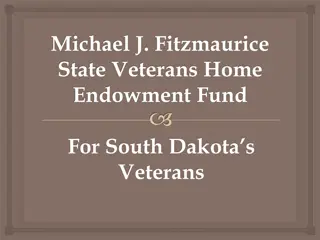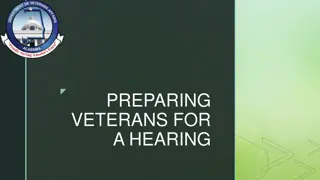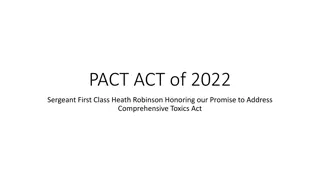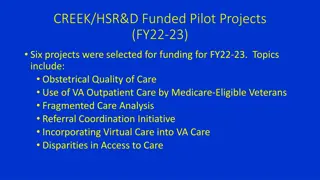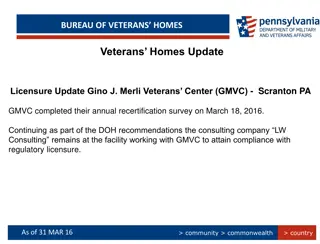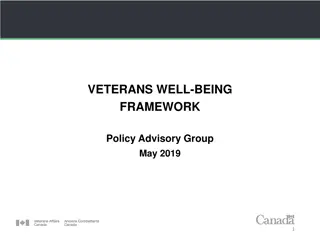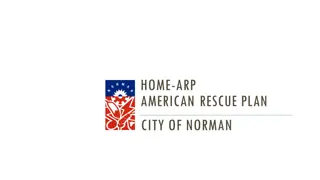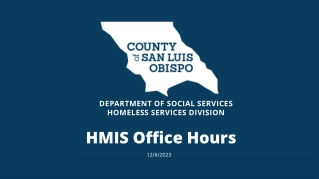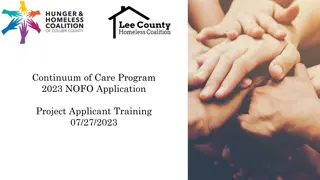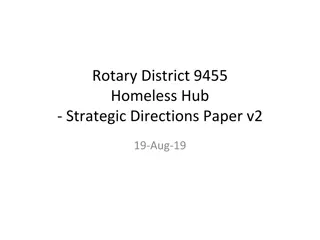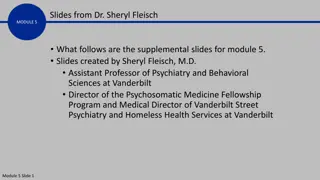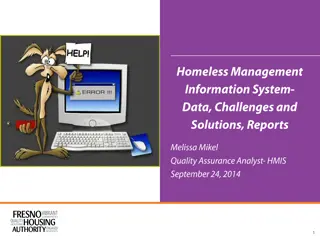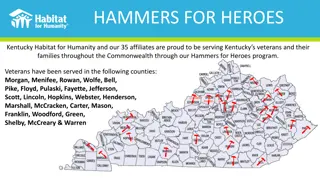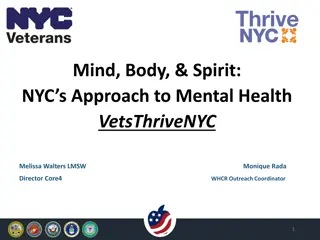Overview of HUD-VASH Program for Homeless Veterans
HUD-VASH is a collaborative program between HUD and VA, offering permanent supportive housing to homeless veterans. Initially focused on mentally ill veterans, the program expanded in 2008 to provide housing stability and support services without treatment requirements. Eligibility criteria include homelessness, VA services qualification, case management needs, AMI threshold, and compliance with sex offender registration requirements. The program follows a Housing First philosophy, prioritizing veterans' housing rights and independence. Clinical models are evidence-based, with case management as a key component for promoting stability and achieving veterans' goals.
Download Presentation

Please find below an Image/Link to download the presentation.
The content on the website is provided AS IS for your information and personal use only. It may not be sold, licensed, or shared on other websites without obtaining consent from the author. Download presentation by click this link. If you encounter any issues during the download, it is possible that the publisher has removed the file from their server.
E N D
Presentation Transcript
HUD-VASH 101 An Introduction and Overview of the Program DEPARTMENT OF HOUSING AND URBAN DEVELOPMENT (HUD) & DEPARTMENT OF VETERANS AFFAIRS (VA) SUPPORTIVE HOUSING PROGRAM
What is HUD-VASH? Joint Venture between the U.S. Department of Housing and Urban Development (HUD) and the U.S. Department of Veterans Affairs (VA) Provides permanent supportive housing (PSH) to eligible homeless Veterans Pilot Program from the 1990s focused on seriously mentally ill (SMI) Veterans and had a 5 year case management commitment Renewed and greatly expanded in 2008 through present VA provides case management and supportive services HUD provides housing voucher tenant or project based
HUD-VASH 2008- Present Eligibility expanded SMI not a requirement Case management not time limited based on Veteran s needs Utilizes low barrier, Housing First model Not Housing Only Portability allows Veterans to live in community of their choice (with some limits) Focused on housing stability needs and actions Case management is required; treatment is not required Largest permanent supportive housing program in nation
Eligibility for HUD-VASH VA determines if the Veteran: Is homeless (McKinney/Vento and HEARTH Act definition) Is eligible for Veterans Health Administration (VHA) Services Needs case management services (clinical need) Agrees to participate in case management Public Housing Authority determines Meets Area Mean Income threshold (AMI) Is not on a lifetime sex offender registration requirement
PhilosophyHousing First Housing is a basic human right Respect, warmth, and compassion for all Veterans A commitment to Veterans Housing choice Separation of housing and services Veteran choice and self-determination Recovery orientation Harm reduction Not Housing Only
Use of Evidence Based Clinical Models Housing First Treatment is not required for program Case management participation is required Clinician expected to work at highest level of licensure/ competencies Depends on: Clinician s training Veteran s needs Veteran s goals Threats to the Veteran s housing stability/overall stability
Evidence Based Clinical Models Utilize clinical focus and may use one or more of these Evidence Based models Motivational Interviewing to help move the Veteran toward addressing barriers to housing Transtheoretical Model/Stages of Change Critical Time Intervention Trauma Informed Care Recovery Model Assertive Community Treatment (ACT) Intensive Case Management (ICM) Strengths Based Model
Evidence Based Clinical Models (continued) Harm Reduction Dialectical Behavior Therapy (DBT) especially skills training Cognitive Behavioral Therapy (CBT) Acceptance and Commitment Therapy Interpersonal Psychotherapy Social Skills Training Problem Solving Therapy Cognitive Processing Therapy Supportive Therapy
Targeting Those Veterans with the highest need and/or vulnerability based on clinical and psychosocial circumstances Targets the chronically homeless who are the most vulnerable and often have severe mental health and/or SUD needs Other homeless with diminished functional capacity and need for case management Assess each applicant on an individual basis Chronically homeless are given the highest priority
Targeting (continued) After the chronically homeless, HUD s Prioritization Notice is to be followed Homeless with disability with long periods of episodic homelessness and severe service needs Homeless persons with disability with severe service needs Homeless with disability coming from places not meant for human habitation, safe havens, or emergency shelters without severe service needs Homeless persons with a disability coming from transitional housing VA Priority Populations Coordinated Entry
Case Management and Supportive Services Multidisciplinary Teams Shared Caseloads Identify, assess, admit Providing services based on acuity Facilitate and provide access to appropriate treatment and supportive case management Empower and respect self-determination in areas most important to Veterans Assist with connecting and rooting into community
Phases of Case Management Not linear Intensive: Work toward clinical stability Stabilization: More adept at managing housing and physical, mental health, and SUD Maintenance: Ensure that needed treatment, support, and mentoring assistance continue after placement in housing Preparation for Discharge: Functioning at a very independent level for 6-12 months, sustained a low acuity level Graduation: No longer needs case management but will retain the HUD-VASH voucher
Case Management - Goals Establish a collaborative and therapeutic relationship that promotes access, respect and hope Provide support by working toward housing stability plan goals identified by the Veteran There may be short and long term goals identified Utilizing Motivational Interviewing and Harm Reduction, substance use and mental health diagnoses will be addressed 13
Case Management Goals (cont.) Reassess needs and goals based on changing conditions Inability to maintain sobriety does not lead to discharge from case management if a Veteran can maintain housing Veteran may require brief intervention or higher level of care Every effort should be made to not discharge a Veteran for non-compliance with case management Foster community integration and independence Primary goal: Veteran is able to maintain housing successfully
Case Management Housing Stability Plan Once accepted, a Housing Stability Plan is developed by the case management team and the Veteran. This should be done in the Veteran s words, and reflect his/her goals for success in the HUD-VASH program. It may include: Establishing housing stability (rent paid, following rules, etc.) Meeting employment and income needs Resolving legal and financial issues (credit history) Supporting physical, mental, social health Plans should be reviewed and updated in accordance with local policy and as the Veteran has any significant changes Plans are used to set the framework for the case management team
Case Management PHA Referral Process Gather items required to obtain voucher and secure housing: Identification (Photo) Income and Benefits Credit History and Repair Additional items may be needed for family members When functionally indicated, the case management team assists with: Completing Housing Authority application forms Assisting with transportation Addressing obstacles and barriers Providing organization to the process Facilitating communication between PHA and Veteran 16
Case Management - Roles Coordinate VA and community interventions Act as a liaison with critical partners Landlord PHA Community service providers Make regular home visits to assess Veteran s ability to maintain in a safe environment that promotes: Housing Stability Independence Social Integration Recovery (as defined by the Veteran) 17
Case Management - Roles (continued) Regular re-assessment by Case Managers When there is a change for the Veteran At a minimum when local policy indicates (usually quarterly) In anticipation of a warm hand-off Revision of Housing Stability Plan as: Goals reached Treatment needs change Veteran s goals change Veteran becomes more independent Level of care changes 18
HUD-VASH Operating Requirements Referral to PHA Eligible homeless Veterans that agree to participate in VA case management are referred to the VAMC s partner PHA. The PHA must maintain written documentation of VAMC referrals in their HUD-VASH tenant files. Referred Veterans do not go on a waiting list and no local PHA preferences are applied
HUD-VASH Operating Requirements PHA Screening PHAs may only screen for income eligibility and for lifetime registration under a state sex offender registration program and can only deny issuance of a voucher for those reasons. If a Veteran family adds members after admission, those family members are screened according to normal PHA admission policies
HUD-VASH Operating Requirements Sexual Offenders If the homeless Veteran is subject to state lifetime registration, the PHA cannot issue HUD-VASH voucher to the Veteran. If another family member is the lifetime registrant, the family may be eligible for voucher if the family member subject to the registration requirement is removed from the household.
HUD-VASH Operating Requirements - Income The PHA must determine income eligibility for HUD VASH families in accordance with 24 CFR 982.201. PHAs should discuss these requirements with their partner VAMCs. HUD income limits do not apply at reexams. Income targeting requirements do not apply to HUD- VASH vouchers. However, a PHA may choose to include the admission of extremely low income HUD- VASH families in its income targeting numbers.
HUD-VASH Operating Requirements PHA Screening and Issuance PHA Screening PHAs cannot screen for or deny issuance of a voucher for money owned to the PHA or for criminal or drug activity. A PHA cannot deny issuance of a voucher or admission into the program for zero income status. Issuance of voucher or denial of assistance PHA must either issue a voucher to the referred Veteran or deny assistance. For denials, the PHA must promptly send a denial notice that states the reason and provides for an informal review. A copy of this notice must be provided to the VAMC case manager.
HUD-VASH Operating Requirements Initial Search and Admission and Lease Initial Search Must have an initial term for housing search of at least 120 days. Any extensions, suspensions and progress reports will remain under the policies in the PHA s administrative plan, but will apply only after the initial 120-day term. Admission and Initial Lease Term Initial leases may be for less than 12 months even if this is not the prevailing market practice. Point of program admission is when unit selected by the Veteran comes under Housing Assistance Payments Contract and lease.
HUD-VASH Operating Requirements Rental Determination Rent calculation for HUD-VASH clients are the same as under the regular voucher program A PHA can charge a minimum rent of up to $50 If a Veteran is awaiting notification about the receipt of VA benefits or other forms of assistance, the PHA must grant the Veteran a hardship exemption (See 24 CFR 5.630 (3)(b)). In such cases, a PHA cannot delay voucher issuance or admission until the benefits are received.
HUD-VASH Operating Requirements Eligible Housing Standard HCV requirements regarding unit size, HQS and payments standards apply. However, VA-owned units on the grounds of a VAMC are eligible housing for the HUD-VASH program. 24 CFR 982.352(a)(5) has been waived for HUD-VASH.
HUD-VASH Operating Requirements - Turnover Upon turnover, HUD-VASH vouchers must continue to be issued to eligible Veteran families referred by the VAMC.
Registration of Interest Notice PIH 2018-07 (HA) Must have a dated letter of support from the VAMC Approximately 5,000 new HUD-VASH vouchers
National Staff VA Staff Jesse K. Vazzano, LICSW National Director HUD Staff Becky Primeaux Director, Office of Voucher Management and Operations Molly Allen, Housing Program Specialist Teresa Pittman, LCSW Regional Coordinator Region 1: VISNs 1, 3, 4, 5, 9, and 23 Deborah Lee, LCSW, LCAS Regional Coordinator Region 2: VISNs 7, 8, 10, 15, 16, and 17 Ann Shahan, BSN, M. Ed. Regional Coordinator Region 3: VISNs 12, 19, 20, 21, and 22 Robert Bob Urell Management and Program Analyst Darrin Dorsett, Housing Program Specialist Phyllis Smelkinson, Housing Program Specialist
